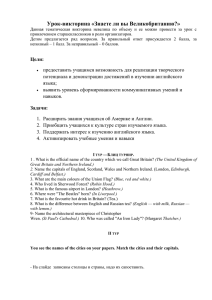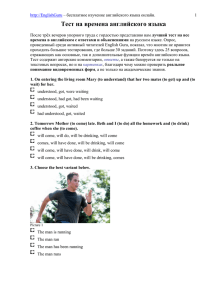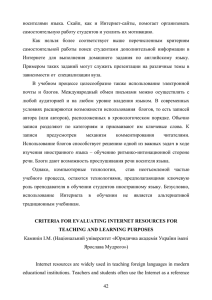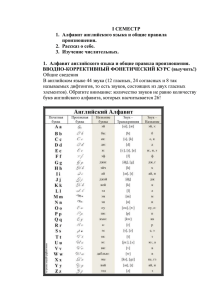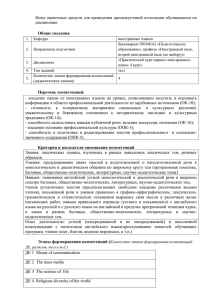Муниципальное образовательное учреждение гимназия села
advertisement
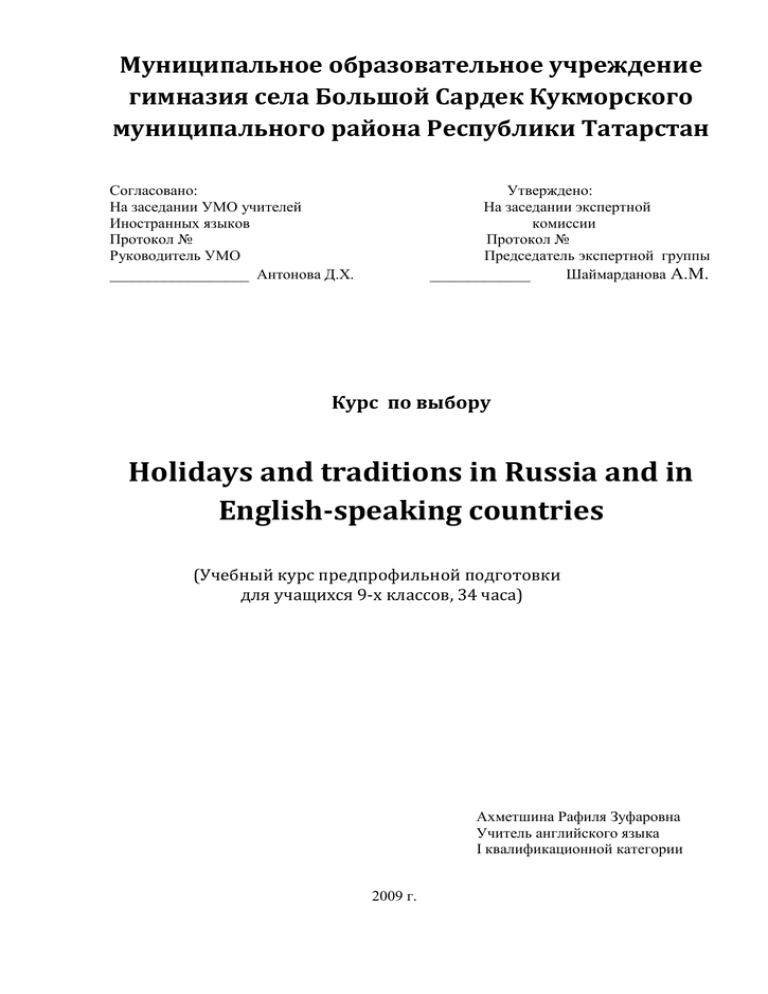
Муниципальное образовательное учреждение гимназия села Большой Сардек Кукморского муниципального района Республики Татарстан Согласовано: На заседании УМО учителей Иностранных языков Протокол № Руководитель УМО __________________ Антонова Д.Х. Утверждено: На заседании экспертной комиссии Протокол № Председатель экспертной группы _____________ Шаймарданова А.М. Курс по выбору Holidays and traditions in Russia and in English-speaking countries (Учебный курс предпрофильной подготовки для учащихся 9-х классов, 34 часа) Ахметшина Рафиля Зуфаровна Учитель английского языка I квалификационной категории 2009 г. Пояснительная записка Данная программа предназначена для учащихся, изучающих английский язык в 9 классе и имеющих основные понятия по правописанию и грамматике английского языка. Работа по данному курсу знакомит учащихся с праздниками и традициями в России и в странах изучаемого языка. Изучение предлагаемых тем происходит на основе научно-популярных, газетных статей, не рассматриваемых на уроках английского языка. Поэтому это дает возможность расширить и углублить знание учащихся по английскому языку. Курс рассчитан на 34 часа в 9 классе. Актуальность содержания элективного курса также мотивирует учащихся к изучению иностранного языка, способствует развитию учебных, коммуникативных и презентационных умений и навыков. Для выработки соответствующих умений и навыков свободно и правильно выражать мысли на английском языке. Курс предполагает активизацию навыков употребления всех английских времен. Цель данного курса состоит в удовлетворении индивидуальных образовательных интересов, потребностей и склонностей каждого ученика и подготовке его к последующему профильному обучению. Задачи курса: 1. Повторить все времена английского глагола. 2. Изучить тексты о праздниках и традициях в России и в странах изучаемого языка. 3. Выполнить тесты по лексическому материалу курса. 4. Провести контрольную работу по всем видовременным формам английского глагола. 5. Тренировать разные виды речевой деятельности. Требования к уровню знаний учащихся: Учащиеся должны знать: - все видовременные формы английского языка; - истории праздников и традициий в России и в странах изучаемого языка; - изученный лексический материал данного курса. Учащиеся должны уметь: - грамматически правильно строить предложения, употребляя все времена английского глагола, связывать их в целое высказывание; - рассказывать о праздниках и традициях в России и в странах изучаемого языка. Промежуточными контрольными точками являются тесты на структуру предложения, написание сочинений, пересказ текстов, а также проигрывание диалогов на английском языке. Итоговой контрольной работой является тест по лексическому материалу данного курса и решение заданий по всем изученным временам английского языка. Оценивание производится по пятибалльной системе. Ожидаемые результаты . По окончании изучения курса учащиеся узнают историю, получать навыки письма эссе, включающее аргументы своей точки зрения. Даст возможность общения на английском языке на основе страноведческих знаний, так как явления язык и культура неразрывно связаны друг с другом. Это предопределяет усиление лингвострановедческого компонента в содержании обучения английскому языку, который включает в себя информацию о стране изучаемого языка, знакомя школьников с ее культурой, обычаями, традициями особенностям уклада жизни и нравами носителей данной культуры. Содержания курса 1. Введение «Праздники и традиции в России и в странах изучаемого языка» (2часа). 2. Тексты о праздниках и традициях в России и в странах изучаемого языка (19 часов). 3. Задания по всем видовременным формам английского глагола(8 часов). 4. Повторение лексического материала данного курса (1 час). 5. Тесты по лексическому материалу данного курса(1 час). 6. Повторение всех видовременных форм английского языка (1 час). 7. Контрольная работа по всем видовременным формам английского глагола(1час). 8. Систематизация изученного грамматического и лексического материала(1 час). Тематическое расположение курса № Тема Задачи изучения темы 1. Вводное занятие “Праздники и традиции России и странах изучаемого языка”. “Holidays and traditions in Russia” практика в чтении. “My favorite holiday”. Аудирование. Работа над текстом. “Holidays in Russia”. Диалогическая речь. Активизация английских времен. Ознакомить с темой элективного курса и провести вводное занятие. 2. 3. 4. 5. 6. 7. 8. Настоящее простое время на основе текста “My summer holidays” “Maslenitsa”. Чтение с целью получения дополнительной информации. Будущее, настоящее, прошедшее простое времена. Колво часо в 1 Языковой материал Тренировать учащихся в чтении. 1 Christmas comes but once a year Урок презентация Практиковать уча-щихся в аудировании. 1 New Year’s Eve, see the New Year in, beforehand Ответы на вопросы Активизировать навыки диалогической речи. Активизировать на-выки употребления английских времен. Тренировать в употребление настоящего простого времени. Учить использовать язык как средство получения информации. Тренировать в употребление будущего,настоя щего, прошедшего простого времён. 1 Sights, gay, turkey, impress Групповая работа 1 Времена в английском языке. Практическое занятие 1 1 1 Формы проведени я Беседа Настоящее Практичеспростое кое время;become занятие sunburnt, beach, angler, fishing-rod Pancakes, caviar, Дискуссия honey, scarecrow Будущее, настоящее, прошедшее простое времена Практическое занятие 9. “My weekend”. Диалог по тексту. 10. Прошедшее простое время на основе текстов знаменитостях. 11. “English traditions” Чтение с целью получения дополнительной информации. Продолжительны Активизировать е времена.Present навыки Progressive, Past употребления Progressive, Future продолжительны Progressive. х времен. “New Year’s Практиковать в Day”. связной устной Монологическая речи. речь. “Customs and Отработать Traditions in Great чтение Britain”. Работа с труднопроизноси текстом. мых слов. 12. 13. 14. Активизировать навыки диалогической речи. Тренировать в употреблении прошедшего простого времени. Практиковать учащихся в связной устной речи. 1 1 Дискуссия Урокпрезентация Carefully keep, “There is no place like home”, teadrinkers 2 ПродолжиПрактичестельные времена кие занятия 1 Beforehand, see the New Year in, relatives 2 To be famous all Практичесover the would, a кие bowler hat, a занятия saint, a trick, to dance round the Maypole Boxing Day, ПрактичесGood Friday, кое Easter Monday, to занятие date back to, observance of smth Cornflakes, a Урокbuttered toast, презентаpickles, a mutton ция chop, high tea Heart-shaped, Урокcandy, adult, презентаfestival ция “Public Holidays in the United Kingdom”. Монологическая речь. Практиковать учащихся в монологической речи. 1 16. “Traditional Meals in Britain”. Проектная работа. “St. Valentine’s Day”. Аудирование. Работа над текстом. Совершенные времена. Present Воспитание потребности к творчеству. 2 Практиковать уча-щихся в аудировании. 1 Активизировать навыки употреб- 1 18. Урокпрезентация 2 15. 17. It’s possible, flower-show, splendid, unique, rare Прошедшее простое время. Совершенные времена Урокпрезентация Практическое 20. “Holidays in Tatarstan”. Проектная работа. ления совершенных времен. Практиковать учащихся в связной устной речи. Тренировать учащихся в проектной работе. 22. “April Fool’s Day”. Диалогическая речь. Практиковать учащихся в диалогической речи. 1 23. Совершеннодлительное времена. Present Perfect Progressive, Past Perfect Progressive, Future Perfect Progressive “May day”. Аудирование. Работа над текстом. Повторение по изученным темам. Тренировать в употреблении совершенно длительных времен 1 Практиковать уча-щихся в аудировании. 1 1 Практическое занятие 1 Письменные и устные ответы на вопросы, монолог 2 19. 24. Perfect, Past Perfect, Future Perfect. “The 8th of March”. Практика устной речи. 26. Контроль знаний учащихся по изученным темам. Обобщить изученный лексический материал. Провести контроль знаний лессики учащихся. 27. Повторение времен в английском языке. Тест по изученному грамматическому материалу. Обобщить изученный грамматический материал. Провести контрольный тест по всем временам 25. 28. занятие 1 Well dressed, guest, gifts Урокбеседа 2 Pilgrimage, day by a drummer Защита группового проекта 1 Harmless, a sense Парная of humour, hairработа do, hair-cut, in fact, in order, in a proper way,silly СовершенноПрактичесдлительное кое времена занятие To be a good mood, congratulate, swan, maypole Практическое занятие Письменный тест. 29. Систематизация изученного грамматического и лексического материала. Итого английского языка. Систематизировать изученный лексический и грамматический материал . Итоговое обсуждение 1 34 Контролирующие материалы 1. 2. 3. 4. 5. 6. Монологическая речь о праздниках и традициях в России и в странах изучаемого языка (Приложение №1). Диалогическая речь по всем изученным темам. Творческие работы учащихся, посвященные данной теме. Защита проектных работ. Итоговый тест по изученному лексическому материалу (Приложение № 2). Итоговый тест по изученному грамматическому материалу (Приложение № 3). Темы диалогической речи: 1. 2. 3 4 “April Fool’s Day”. “My weekend”. “My favorite holiday”. “Holidays in Russia”. 5. “English traditions” Темы проектов: 1. Мой любимый праздник. 2. Национальные праздники Татарстана. 3. Национальная блюда Татарстана. 4. Британские праздники и традиции Великобритании. 5. Национальная блюда Великобритании. Список литературы для учителя 1. Английские времена в текстах и упражнениях. / А.В. Нагорная. Москва: Айрис-пресс, 2007 2. Английская грамматика в тестах. / Л.И. Романова. Москва: Айрис-пресс, 2007 3. Английский язык для школьников и поступающих в ВУЗы. Письменный экзамен. Тесты./ Цветкова И.В., Клепальченко И.А., Мыльцева Н.А./ Москва: Глосса-пресс 2004 4. Английский язык для учащихся 9 класса./ Н.Г.Майнина ./ Волгоград ,2005 5. Все правила. Современного английского языка./ Издательство. Баро/пресс. Ростов на Дону, 2003 6. Грамматика. Сборник упражнений. / Голицынский Ю.Б. Санкт Петербург: КАРО, 2004 7. “English Grammar” Reference and practice./ Т.Ю.Дзордова, А.И.Берестова, В.Г.Майлова./ Антология. Санкт Петербург, 2005. 8. Повторяем времена английского глагола./Т.Б.Клементьева/Москва Дрофа, 1997 9. Тематический сборник по английскому языку. 9 класс. / Т.Ю. Журина. 10. Тесты по грамматике английского языка./Татьяна Николенко/ Айрис пресс Москва, 2003 11. Spoken English. Пособие по разговорной речи. / Голицынский Ю.Б. Санкт Петербург: КАРО, 2005 12. 55 устных тем по английскому языку для школьников. 5-11 классы. / Т.Ю. Журина. Москва: Дрофа, 2006 13. 95 устных тем по английскому языку для школьников. 5-11 классы./Елена Занина. Москва: Айрис пресс 2006 Список литературы для учащихся 1. Тематический сборник по английскому языку. 9 класс. / Т.Ю. Журина. 2. Тесты по грамматике английского языка./Татьяна Николенко/ Айрис пресс Москва, 2003 3. Spoken English. Пособие по разговорной речи. / Голицынский Ю.Б. Санкт Петербург: КАРО, 2003тных тем по английскому языку 4. 55 устных тем по английскому языку для школьников. 5-11 классы. / Т.Ю. Журина. Москва: Дрофа, 2006 5. 95 устных тем по английскому языку для школьников. 5-11 классы./Елена Занина. Москва: Айрис пресс 2006 (Приложение №1) NEW YEAR'S DAY There are many holidays in our country. They are: New Year's Day, Christmas, Women's Day, Victory Day, May Day and others. I like New Year's Day, it is my favourite holiday. The 1st of January is a winter holiday and now it is the first day of the New Year. Peter the First changed the Russian calendar in 1699. He made the 31st of December, 1699 the last day of the year. The first of January 1700 became New Year's Day. The 1st of January is in the middle of winter. The weather is usually fine and there is a lot of snow everywhere. As the 1st of January is a holiday I don't go to school and my parents don't go to work. We usually have a very interesting New Year's party at school. We have it on the 28th or 29th of December. Our family prepares for this holiday beforehand. My father buys and brings home a beautiful New Year's tree at the end of December. Our family has a tradition to buy it. I like to decorate the New Year's tree with toys, little coloured lights, sweets and a beautiful star on the top. My mother and grandmother prepare our holiday supper and lay the table. I make a cake. All the members of our family clean the flat before this nice holiday and then each of us tries to dress well. We like to see the New Year in at home with our relatives. They come to see us at 11 o'clock in the evening. At 12 o'clock we are sitting at the table and we are glad to see the New Year in. We say, "Best wishes for the New Year!" I hope that next year will be better than the last one. The New Year's Day is always connected with our new hopes and dreams. It is a pleasant moment to get presents on New Year's Eve. I usually get many nice useful things from my parents and relatives. My parents put their presents under the New Year's tree. We don't go to bed till morning, we watch TV, dance, eat tasty things and make jokes. I enjoy this holiday very much. WORDS New Year's tree — новогодняя елка relative — родственник New Year's Eve — канун Нового года see the New Year in — встречать Новый год beforehand — заранее QUESTIONS 1. Аre there many holidays in our country? 2. What is your favourite holiday? 3. Do you go to school on the 1st of January? 4. Who brings the New Year's tree home? 5. Do you like to decorate the New Year's tree? 6. What can you see on the top of this New Year's tree? 7. Have you got a holiday party at school? 8. Who lays the table for the party? 9. Where do you prefer to see the New Year in? 10. What kind of presents do you like to get? 11. You like this holiday, don't you? (Приложение №1) Customs and Traditions in Great Britain Some English customs and traditions are famous all over the world. Bowler hats, tea and talking about the weather, for example. From Scotland to Cornwall, the United Kingdom is full of customs and traditions. Here are some of them. St. Valentine's is the saint of people in love, and St. Valentine's day is February, 14. On that day, people send valentine cards and presents to their husbands, wives, boyfriends and girlfriends. You can also send a card to a person you don't know. But traditionally you must never write your name on it. Some British newspapers have a page for Valentine's Day messages on February 14th. April, 1 is April Fool's Day in Great Britain. This is a very old tradition from the Middle Ages. At that time servants were masters for one day of the year. Now April Fool's Day is different. It's a day for jokes and tricks. May, 1 was an important day in the Middle Ages. In the very early morning young girls went to fields and washed their faces with dew. They believed this made them very beautiful for a year after that. Also on May Day young men of each village tried to win prizes with their bows and arrows, and people danced round the Maypole. November, 5 is Guy Fawkes's Day. All over the country people build wood fires, or "bonfires", in their gardens. On top of each bonfire is a guy, this is a figure of Guy Fawkes. On November, 5, 1605, Guy Fawkes tried to kill King James I. He and a group on his friends put a bomb under the Houses of Parliament in London. But the king's men found the bomb and Guy Fawkes. They took him to the Tower of London, where his head was cut off. Before November 5, children use guys to make money. They stand in the street and shout: "Penny for the guy". Topical Vocabulary to be famous all over the world - быть известным во всем мире bowler hat – котелок to be full of customs and traditions –быть полным обычаев и традиций a saintт - святой to send valentine cards to smb.- посылать валентинки кому-либо a Valentine's Day message - послание Дня святого Валентина April Fool's Day - День смеха the Middle Ages - средние века a servant - слуга a master - хозяин a trick - проделка, проказа to wash one's face with dew - умывать лицо росой to win a prize - выиграть приз to dance round the Maypole - танцевать вокруг майского шеста to build a bonfire - устроить костер to put a bomb under smth. - заложить бомбу под что-либо to cut one's head off - отрубить голову кому-либо to use a guy to make money - использовать чучело, чтобы заработать денег Answer the questions: 1. What proves that the United Kingdom is a country of 2. How is St. Valentine's Day marked? 3. What is April Fool's Day? 4. What are the old traditions of May Day? 5. Why is the guy put on top of the bonfire on November, 5? Translate into English: 1. Соединенное Королевство полно обычаев и традиции, известных во всем мире. 2. День святого Валентина, святого влюбленных, отмечается 14 февраля. 3. 1 апреля — день смеха, день шуток и проделок, 4. 1 мая — праздник прихода (coming) весны. 5. 5 ноября люди сооружают большие костры и сжигает (burn) чучело Гая Фокса. 6. Гай Фокс жил в 17 веке и пытался подложить бомбу под парламент. (Приложение №1) THE 8th OF MARCH There are many holidays in our country, the 8th of March is one of them. It is a happy and nice holiday. It is a good tradition in our country to give presents and flowers to women on this day. Each family celebrates this spring holiday. In the morning men go to the shops or markets to buy some flowers. They try to clean flats and help women to cook a holiday dinner. Sons and daughters help their mothers too: they make a cake, lay the table and wash dishes after holiday dinner. All the members of the families try to be well dressed on this day. Some families celebrate the 8th of March by going to the theatres and concerts. They buy tickets beforehand. Others prefer to invite guests and stay at home. There is almost the same holiday in England. It is called Mothers' Day and celebrated also in spring. Sons and daughters come and give gifts to their mothers on this day. If it is not possible to see your mother, you can send presents and cards to her. Flowers and cakes are the traditional gifts for all mothers in England. All women try to be pretty and happy on this day. WORDS 1. well dressed — нарядный 2. guest — гость 3. gifts — подарки QUESTIONS 1. Is the 8th of March a very nice holiday? 2. What kind of holiday do we have on the 8th of March? 3. What do men usually give to women on the 8th of March? 4. Men help women about the house on the 8th of March, don't they? 5. How do you celebrate this holiday? 6. Why do all women want to be pretty during this holiday? 7. Where do you go on the 8th of March in the evening? 8. What holiday in England is like the 8th of March? 9. What are the traditional gifts for all mothers in England? (Приложение №1) CHRISTMAS DAY Every country has its own customs and traditions. English people are proud of their traditions and they keep them up. It is difficult to speak about England without speaking about its holidays. Christmas Day is one of them. All English people celebrate Christmas (or X-mas) on the 25th of December. Christmas! What kind of holiday is it? It is the yearly celebration of the birth of Jesus Christ. It falls on December 25 in the Catholic Church and on the 7th of January in the Orthodox Church. This holiday means the beginning of the new year and the new life. English people celebrate this holiday with the evergreen tree — Christmas tree. Children put a long sock, called a Christmas stocking at the end of their beds and Santa Claus comes down the chimney to bring them presents. Christmas Day is the greatest holiday in England. It is interesting to visit the shops before this holiday. There are a lot of nice Christmas cards and presents there. English people like this holiday very much and prepare for it beforehand. They buy presents for each other, try to send Christmas cards for their relatives and friends. It is interesting to visit London during this holiday. There is a Christmas tree in Trafalgar Square. We can see many lights, toys and sweets all over this tree. Everywhere you can see slogans "Merry Christmas and Happy New Year". The traditional English dinner on Christmas is turkey and pudding. WORDS 1. Orthodox Church — православная церковь 2. sock — носок 3. stocking — чулок 4. chimney — труба, камин 5. beforehand — заранее 6. Trafalgar Square — Трафальгарская площадь 7. turkey— индейка QUESTIONS 1. What do you know about national holidays in England? 2. What kind of holiday is Christmas? 3. When do English people celebrate Christmas? 4. How do English people celebrate Christmas? 5. There are many Christmas cards in the shops before Christmas Day, aren't there? 6. What can you see in Trafalgar Square on the 25th of December? 7. What is the traditional English dinner on the 25th of December?, 8. Have you seen this holiday in London? 9. Do Russian people celebrate Christmas Day? 10. Do you get presents on this holiday? (Приложение №1) Holidays in Tatarstan Navruz This Muslim festival is dedicated to the arrival of the New Year according with the solar calendar – it is the day of the spring equinox. The celebration of the coming spring, the symbol of the eternal renewal of life, was familiar in many agricultural cultures. It takes place during the spring equinox. Narduga n A Muslim festival with roots in pagan times, which has been preserved principally among baptized Tatars and Mishars. It takes place between December, 25, and January, 5. During this period in the villages mummers would go from house to house with New Year greetings, singing, dancing, and playing musical instruments while the favourite pastime of the girls was fortune-telling, in the course of which soothsaying songs would be performed. Uraza (Ramadan) Uraza (Ramadan – month of fasting). It is annual Muslim festival celebrated according with the lunar calendar. Ramadan Month of fasting Believers take no food, drink or tobacco from sunrise to sunset, and abstain from sexual relations. In many cities, the start of the fast is marked each day by a drummer who beats the bounds of each district and the end of the fast by the firing of a cannon. Technically, the fast begins each day at dawn, which for Muslims comes nearly two hours before sunrise. Sunrise marks the end of the first period of prayer. Dawn is reckoned as the time when the sun’s first light is seen on the horizon. Traditionally, the fast is broken with a bowl of soup and a special salad (fattoush) but the evening breakfast is often an opportunity for reveling which may go on late into the night. Uraza- Bairam (Gait) Uraza-Bairam or Gait (end of the fasting). The night after the end of the fast. This feast marks the end of Ramadan. It commonly lasts 3 days. Kurban-Bairam Kurban-Bairam (festival of sacrifice). It is the annual Muslim festival according with the lunar calendar. It is the culmination of the Hadj or holy pilgrimage and commonly a 4-day holiday. The celebration of the Orthodox Church festivals also has certain interest: the Orthodox Christmas; Maslennitsa (Shrovetide), annual Christian festival of farewell to winter celebrating in February; and Paskha (Easter), the festival of resurrection of Christ celebrating in the end of April. Sabantui Sabantui – "celebration of the plough" – is one of the unique, colourful and especially popular Tatar festivals. It takes place at the beginning of summer in the villages, after the first haymaking, and district centres and completes its progress through the republic in the towns at the end of June. Sabantui brings together many traditional games and competitions, which have developed over the centuries: on the squares at the centre is a pole with a national embroidered cloth attached to it. Everyone can take part in racing with the yoke carrying pails full of water, sack races, smashing pots while blind-folded, running while holding between the teeth a wooden spoon with an egg without breaking it, and tug of war competitions. Or even try their luck at clambering up a pole for a pair of embroidered shoes. Also Tatar wrestling is very popular and, of course, horserace where the skill of trick rider is rewarded with special gifts. (Приложение №2) Тест по изученному лексическому материалу 1. The main song of New Year is … . a) “Jingle, Bells!”; b) “Аuld Lang Syne”; c) “America, America!”. 2. Special name of New Year in Scotland: a) New Year’s Eve; b) Lent; c) Hogmanay. 3. Easter is a holiday when Christians remember … a) …the death of Christ his return to life; b) …Christ’s birthday; c) …Christ’s fasting. 4. Easter Day is celebrated on the… a) Monday; b) Saturday; c) Sunday. 5. The Easter symbol in Britain is the Easter Rabbit. His name is… a) …Bunny; b) …Bobby; c) …Betty. 6. The central figure in May Day celebrations is… a) …a Morris dancer; b) …the May Queen; c) …the Queen of winter. 7. The of Celebrations: a) …turkey with vegetables; b) … the Queen of Britain; c) … Santa Claus. 8. A legend has it that the first Valentine was … a) a bishop; b) a seller; c) a jailer. 9. St. Valentine’s Day is celebrated on … a) … February 18; b) … February 14; c) … February 23. 10. There is a wide-spread custom of sending … a) … greeting flowers; b) … greeting cards; c) … greeting sweets. 11. April Fool’s Day falls on … a) … April 7; b) … April 1; c) … April 17. 12. St. Patrick’s Day is a national Holiday of … a) … Scotland; b) … Britain; c) … Ireland. 13. St. Patrick’s Day falls on … a) April 17; b) March 17; c) September 17. 14. What is Morris? a) … dance; b) … a song; c) … a parade. 15. When is Halloween celebrated? a) on November 1; b) on December 31; c) on October 31. (Приложение №3) Тест по всем временам английского языка. I. Select the right verb form from the a, b, c, d variants. 1. I ........................... the train to London this evening. a) catch; b) will be catching; c) am catching; d) will catch 2. The train to London ........................... at eight o'clock. a) leaves; b) is leaving; c) will leave; d) will be leaving 3. When was that? - It happened in that period of my life, when I ........................... Russian in Berlin. a) taught; b) used to teach; c) was teaching; d) was going to teach 4. I ........................... you everything in the morning. a) am telling; b) will tell; c) will be telling; d) tell 5. This time next week you ........................... the Pacific on your way home. a) will cross; b) are crossing; c) crosses; d) will be crossing 6. We often saw him here that year. He ............................ on that rock watching birds for hours. a)was sitting; b) sat; c) would sit; d) was coming to sit 7. The plane to Manchester .................................... at 4.30. a) takes off; b) will take off; c) is taking off; d) will be taking off 8. They .................................... tomorrow at 8. a) leave; b) will leave; c) will be leaving; d) are leaving 9. He .................................... you to the airport, I'm sure. a) will be driving; b) will drive; c) is driving; d) drives 10. Will Mike come with you? - No, he ................................. with his friends at present. a) will be staying; b) stays; c) is staying; d) will stay 11. When did you write this story? - I .................................... in Warsaw at the time. a) lived; b) was going to live; c) would live; d) was living 12. She made a habit of it. She ........................................ here and play the piano in those days. a) came; b) was coming; c) used to come; d) was going to come II. Translate the underlined words. 1. Я приготовлю (make) чай, пока ты пишешь записку. 2. Сегодня утром я проснулся (wake up) перед самым 1._____________________ восходом. 2.______________________ 3. В какое время она, как правило, приходит сюда? 3.______________________ 4. Когда он придет, я поговорю с ним. 4.______________________ 5. Она вечно задает всем этот глупый вопрос. 5.______________________ 6. Когда мы вернулись (come back), он читал книгу 6.______________________ в кабинете. 7. Ты непрестанно сомневаешься (doubt) в моих словах. 7._____________________ 8. Летом солнце всегда садится (set) поздно. 8._____________________ 9. Когда я сходил (get off) с трамвая, я ушиб (hurt) ногу. 9._____________________ 10. Я уверен, он будет писать отчет, и мы застанем (find) его дома. 10.______________________ 11. Я думаю, мы останемся (stay) здесь. 11.______________________ 12. О чем ты думал, когда ты выбрал этот поворот? 12.______________________ III. Read the passage below and write the appropriate form of each verb in brackets. Dear Mary, I (1. write) ................................ to invite you to our new country house. My brother (2. return) ............................. from the East yesterday and (3. stay) ............................. with us for a while. He (4. meet)............................. your brother Jim when he (5. pass) ............................. through Delhi and (6. take) ............................. some photographs of him. You (7. be) ....................................... glad to see them, I am sure. If you (8. be) ............................. free to come next Friday, I (9. meet) ....................................... you at the station. The afternoon train (10. leave) .............................. from Paddington at three o'clock. Please, come. The Cronins (11. come) .................................... too. They (12. bring)...............................their new film and I (13. not want)............................. you to miss the opportunity to see it. You (14. call) ............................. me on Sunday?
